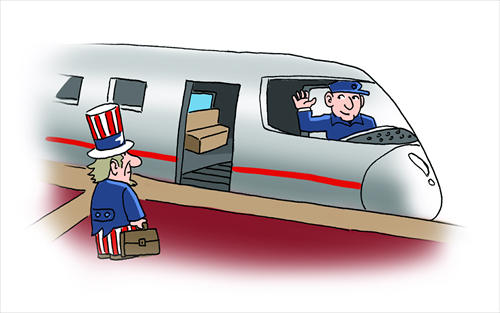HOME >> OP-ED
Rejecting China’s ‘One Belt, One Road’ comes at US’s own cost
By Xu Liang Source:Global Times Published: 2015-6-4 23:13:01

Illustration: Liu Rui/GT
The world is large enough to accommodate not only the US but also China. There has never been a full-scale confrontation between the two countries in history. When Chinese President Xi Jinping raised the "One Belt, One Road" initiative, US leaders have proposed the "New Silk Road" program.
In many people's opinion, competition and conflict is inevitable between the two powers. But the Cold War has ended, and politicians should keep pace with the times. In the era of interdependence, the "One Belt, One Road" initiative of China is not a challenge to the US but offers opportunities because of its open, peaceful and win-win approach. Meanwhile, the mainstream of both the governments and the private sectors are opposed to confrontation and conflict.
In the 21st century, cooperation brings benefits and strife will harm each other. The countries along the "One Belt, One Road" all hope Sino-US cooperation can bring peace and development opportunities to them. It shows that civilized competition and rational cooperation is welcomed in this region.
So the "One Belt, One Road" initiative of China does not exclude the US, and the US is expected to be actively involved. China's ideas of "common interests" and its strategic transparency can help eliminate US worries and build a foundation of US involvement.
The US can take the following approach to participate in the "One Belt, One Road" initiative.
First, the US can create an international mechanism of "creative participation." As economy and trade is the focus of "One Belt, One Road," China and the US can provide the world with diverse choices.
In the era of globalization, economic complementarity is more important than competitiveness. The new type of major power relations between China and the US can make a significant breakthrough by the international mechanism for the Silk Road. In this mechanism, the two countries can share a workforce and complement each other through bilateral or multilateral negotiations.
Second, the US can participate in the "One Belt, One Road" initiative on a small scale at first and gradually establish mutual trust with China through experimentation.
Generally speaking, the possibility of win-win relations in the economic sphere is greater than in the military field, so the US can take the economic and trade fields as a starting point for participating in China's plan.
For example, we can let Sino-US joint ventures act as the vanguard and pioneers of the experimental cooperation. Such cooperation is a way to establish initial relationships. The US should note that regions covered by the Silk Road program are not under US dominance and have fewer regional mechanisms of cooperation, such as Central Asia, South Asia, the Middle East and other regions. China has avoided US-dominated areas and the US should respond positively to China's intentions.
Third, the US can participate in China's plan by "going with the trend." US decision-makers should be aware that even if the US doubts China's plan, China will continue to promote it. The Asian Infrastructure Investment Bank has proved this. If the US insists on not participating in the program, it will miss a great opportunity.
In this process, it is normal for the US to have some doubts. But it will be a great contribution if Washington does not prevent US companies from getting involved at their wills.
If the US government intervenes less, US companies will get more benefits through natural integration and cooperation.
Therefore, the US can take part in China's plan, "creative participation" by the creation of an international mechanism, "small-scale experiments" and "following the trend." It is a good idea that the US recognizes that cooperation is inevitable and cooperation with China is a good way to put their divergences under control in the context of international order.
The author is a research fellow at the China Academy of "One Belt, One Road" Strategy of Beijing International Studies University. opinion@globaltimes.com.cn
Posted in: Viewpoint